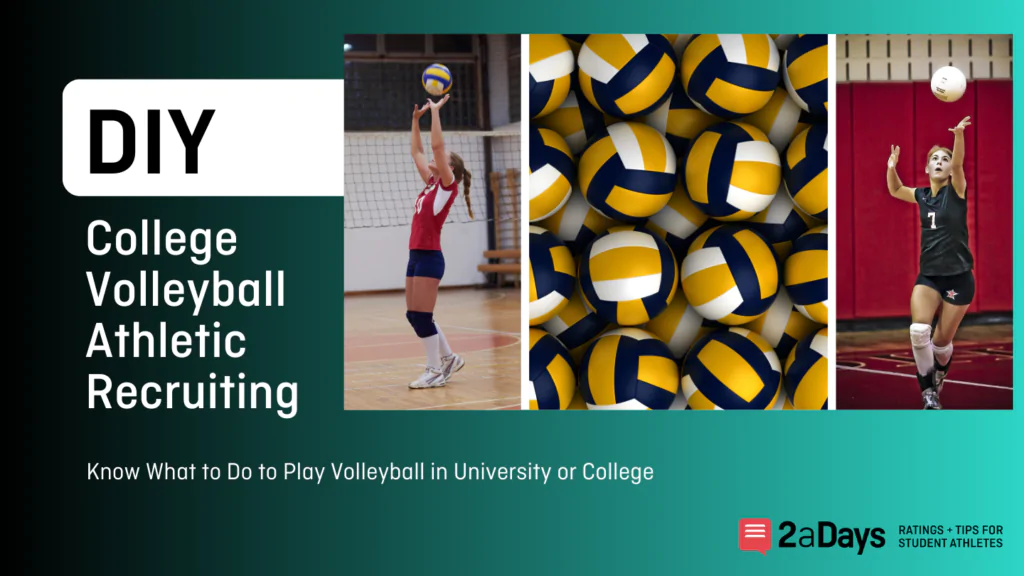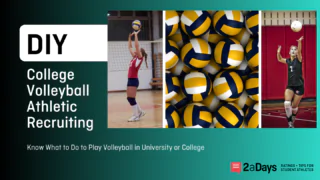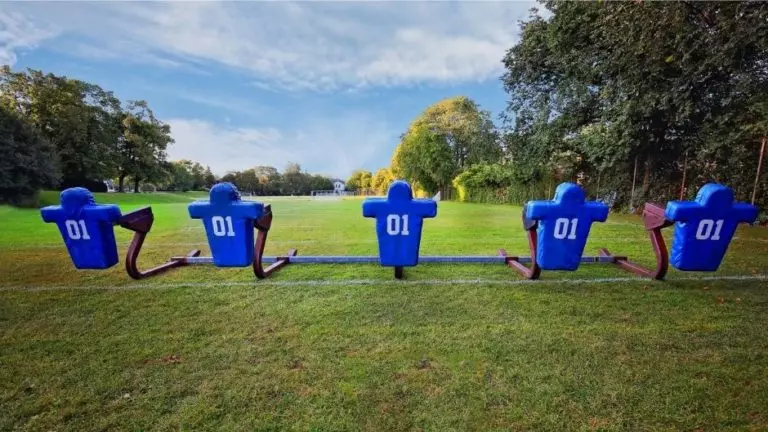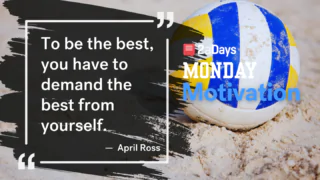Whether you're the parent of a volleyball player or the talented volleyball payer yourself, making the decision to play college sports is both exciting and scary. There are a lot of rules, practices, and unknown etiquette that can scare kids and their families off. Or worse, sometimes, these things can get volleyball recruits into trouble before even starting. Not only that, but many of these norms are sport-specific which only complicates things further — as a volleyball player, your recruiting process will look very different from that of an athlete who plays football or runs track, for instance. It's a lot to think about!
Don't let the process overwhelm you, and certainly don't wait to take initiative. The DIY Volleyball Recruiting Guide will give your family everything you need to know when it comes to the college volleyball recruiting process. This recruiting guide will serve as a checklist to ensure you have your ducks in a row.
Let's not wait a second more. These actionable steps will get you going on the right path starting today so you can ace your recruiting process!
In This Guide
- College Volleyball Recruiting Fast Facts
- About Volleyball Club Teams
- About Volleyball Camps
- About Volleyball Showcases
- Reaching Out to Volleyball Coaches
- Volleyball Highlight Reel Tapes
- Important Links For College Volleyball Recruiting
College Volleyball Recruiting Fast Facts
Recruiting Statistics (from Scholarship Stats.com)
- There are 463,328 girls and 70,686 boys who play high school volleyball.
- 6.2% of high school girl volleyball players and 6% of boys go on to the college level.
- 1.12% of high school girls are recruited into NCAA Division I volleyball.
- 0.7% of high school boys are recruited into NCAA Division I volleyball.
- Consists of 2 seasons: Fall (W)/Spring (M)
3 Levels of College Volleyball in the United States
NCAA Divisions: DI, DII, and DIII

The National College Athletics Association (popularly known as the NCAA) is the “most well-known governing body of college volleyball” and consists of around 1,200 schools. The NCAA is broken down into DI, DII, and DIII based on the level of competitiveness. In DI and DII, coaches are not allowed to contact an athlete until June 15th after their sophomore year of high school.
“At the Division 1 level, the average height of an outside hitter is 6'0”, with 53% of D1 outside hitters at 6′ 0″ or taller. Only 13% are 5'9” or shorter. Coaches expect D1 outside hitters to have, on average, an 118-inch approach jump.
NAIA
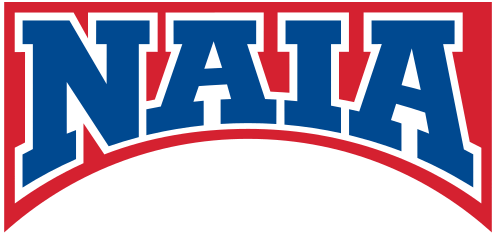
The National Association of Intercollegiate Athletics (NAIA) has two divisions. It is a smaller association with around 300 schools.
The NAIA also has different academic requirements than the NCAA. Like the NCAA, NAIA offers four-year schools but has significantly fewer students than the NCAA.
JUCO
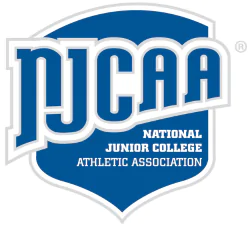
The National Junior College Athletic Association (NJCAA) or JUCO has three divisions and covers 2-year schools. The NJCAA has around 525 member schools with three divisions.
- It offers athletes a chance to get their grades up if they do not meet the academic standards for their school of choice at the time of application.
- It offers athletes a chance to refine their skills and get more playing time before entering a four-year college.
- It establishes a time dedicated to self-discovery and maturity before entering college, allowing athletes to become more confident.
- It gives more time for those who started the college sports recruiting process later than they wanted.
Required to be Recruited or Must Dos for College Volleyball Recruiting
- Club team required? 🗹 Yes
- Highlight tape required? 🗹 Yes
- Camps recommended? 🗹 Yes
- Showcases required? 🗹 Yes
- Headcount or equivalency sport? Headcount for women, equivalency for men
Related Post: Differences Between DI, DII, and DIII in Volleyball
About Volleyball Club Teams
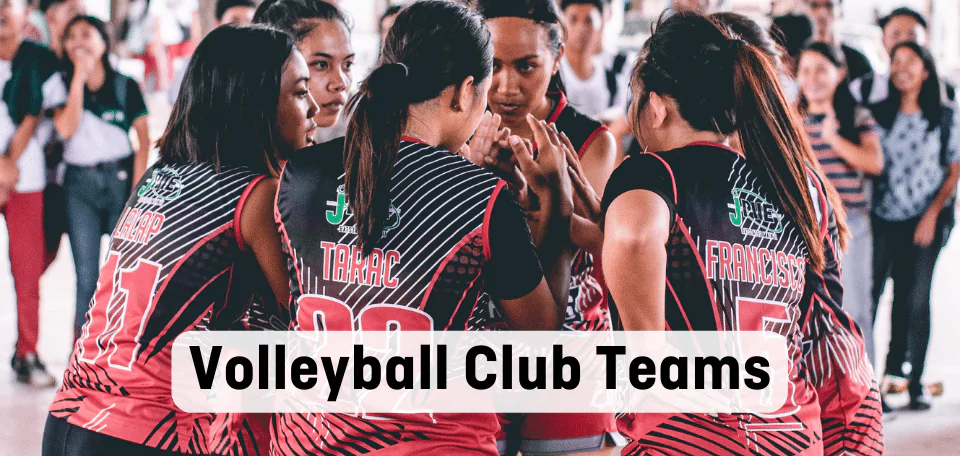
5 Types of Volleyball Club Teams
Club volleyball has different levels of intensity and it all depends on the skills each player has. All of these can help an athlete get out there and be known. Currently, there are 5 different divisions of club volleyball:
- The Open Division is the top level of play out of the five. To qualify for this division, the team must earn a bid by participating in a national qualifier open division event. Here, many recruiters will keep their eyes open on athletes and can get you a lot of exposure.
- The National Division is more focused on showcasing regionally strong teams and to allow more teams the opportunity to participate in Junior Nationals
- The USA Division is very similar to the National Division but their process is a little different. The team can participate if they earned a bid at a national qualifier or earn their bid from their region
- The American Division is the last division in which you can qualify for a national qualifier.
- Lastly, the Patriot Division. There is no need to qualify for this division and is open to anyone who is looking for an end of the season tournament.
Club Volleyball Tips
- It may be the case that some players cannot afford to play club sports and the high school athletic system is their only option. Researching and having profound knowledge of your options will allow you to prioritize and use your available resources in the right places.
- It is rare for recruiters to show up to high school games, so try to make as many videos as you can where they can see you play.
- Research college camps–there is always a chance you might get funding.
- High school teams are also important and a plus when going into the volleyball recruiting process. Even though it may not be a very competitive team, it is able to provide a lot of variety when it comes to competition. High schools may have their own playing style, and that is okay. It is always good to have more experience in the sport as this will make you a more adaptable athlete for future opportunities.
Related Post: 4 Ways Social Media Can Impact Your Recruiting Process (For Better or Worse)
About Volleyball Camps
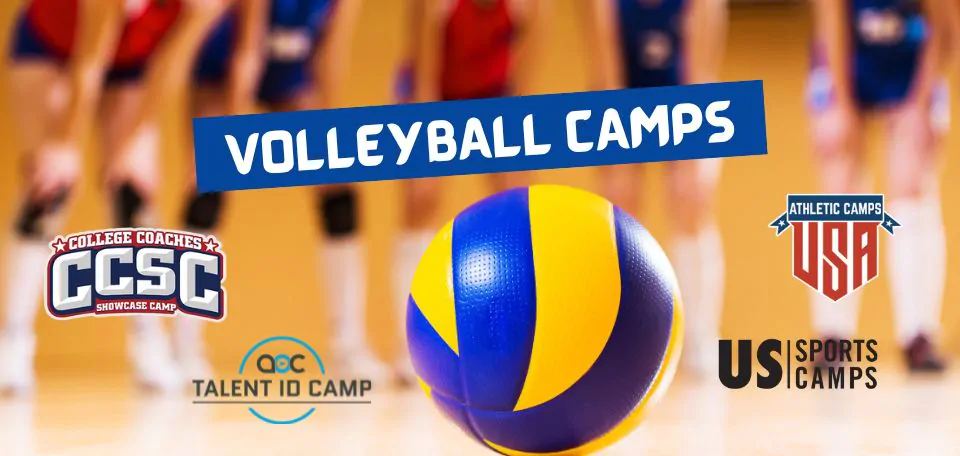
4 Types of Camps
In the volleyball world, there are four types of camps in different divisions:
- Elite Camps (Prospect/ID) are the types of camps that give the best chance of getting the attention of a college program. These camps do not restrict attendance to anyone. These camps offer high training for players and provide exposure to college coaches.
- Position-specific camps that revolve around your position and in developing the skills required for such. It focuses on position-specific training for all positions in the court. That is, right sides, outside hitters, DS, liberos, and setters. These camps are for those who are looking to improve their personal and position-specific skills. This is a more training-centered camp than evaluation.
- All-skills camps provide a general gist of skills but are more towards young athletes. These camps are broken down into age and or skill level. Those being: beginner, youth, intermediate, and elite.
- Team camps are for programs to better improve the team's chemistry and connection. These camps depend on the high school clubs' coach approval to attend. Team camps are more centered toward recruiters and coaches look at the team competing against others. These camps help recruiters target athletes and have good identification.
Related Post: How to Stand Out to DI Coaches as a Men's Volleyball Player
NCAA Rules and Guidelines for Sports Camps
The NCAA has certain rules and guidelines for what camps an athlete can attend. These are:
Attendance Restriction
- Camps and clinics must be open to any and all entrants
- Enrolled college athletes cannot enroll as campers at their own institution's camp
- Prospective college athletes may be invited to attend camps as long as it is legitimately advertised and open to all
Fee/Reduced Camp Admission
- Any individual being recruited by an institution may not be given free or reduced admission privileges to any camp or clinic or pay their expenses to attend
- Discounted camp admission may only be given based on objective criteria that is not related to athletic ability and should be published and available on an equal basis to all who qualify
- Example: registration prior to a specific deadline
Group Discounts
- Can be offered to coaches and athletes as long as they are available on an equal basis to all who wish to use them
Camp Advertisements
- All camp advertisements must state that they are open to any and all entrants
- Can be advertised in a recruiting publication that contains its directory as long as the ad doesn't exceed certain requirements
Recruiting Calendar
- Cannot be conducted during a sport's “dead period” and prospective student-athletes may not be treated differently from any other campers
Phone Calls
- Phone calls, emails, and faxes may be made to an individual or his/her parents legal guardians or coach as long as the calls relate solely to camp or clinic logisticas issues
Media Presence
- Media may not be invited to attend or provide special access to camps or clinics and the prospective student-athlete in attendance. The media who does attend and are present at an institutional camp or clinic can only be located in areas open to the general public and are not allowed on the playing field, during or at the conclusion of camp
Benefits
- If offered benefits, these must be legitimately advertised and made available to all attendees
Awards
- Can receive awards as long as there is an understanding that the cost of such awards is included in the admission fees charged
Impermissible Camp Activities
- The institution cannot engage in activities devoted to measuring agility, flexibility, speed or strength for evaluating a prospective student-athlete
College Athlete Camp Employment Rules
- Current college athletes may be assembled and used from demonstration purposes during a camp as long as it is outside of the playing season and within the weekly hour limitations
- Current college athletes participating in a scrimmage during an institutions camp or clinic cannot be observed by that institutions coaching staff
- Those college athletes with remaining eligibility may not conduct their own camp and a coach must provide the compliance office a list of student-athlete employees and their rate of pay prior to their employment
Prospective College Athlete Camp Employment
- High school, preparatory school or two-year college athletes or any other individual being recruited by an institution may not be employed at any camp or clinic
- They can be employed after the athlete has signed a National Letter of Intent or the institution's written offer of admission and/or financial aid.
Related Post: 6 Pros and Cons of Recruiting Camps
Camp Tips:
- In camps, the coaches are not just looking at your individual skills and talents, but how you are able to adapt to different people, scenarios, and atmospheres.
- Since volleyball is such a team-oriented sport, coaches will be on the lookout for athletes that work well with others.
- Before going to a camp, make sure you reach out to the coach or coaches you are interested in so they know to watch you play.
- Camps and showcases do come with a cost, so think ahead of time which ones you can or cannot attend!
- Most camps and showcases are available for anyone to register and attend, but there's no need to attend all of them. There are elite showcase camps and sponsored camps that can only be attended with an invite, and these are for top-performing athletes.
- Don't stress out if you aren't invited to a private showcase or camp; this does not mean you are not a top recruit. Coaches will invite a lot of athletes to their showcases and camps as this helps to finance the program to keep it running. If you do receive an invitation but will not be in attendance, remember to politely decline the offer and try to stay in contact for further communication.
- Many colleges host their own camps and showcases on campus. It is always good to be on the lookout for those if you have a specific college in mind.
- Remember: college coaches are also evaluating your parents at camps! Many parents attend camps and showcases, and coaches and recruiters notice them. Their attitude and actions also have an effect on how coaches view the recruit and can have an impact on their recruiting process.
- Parents are always welcomed to be involved, but there is a limit as to how involved they should be. If they are too involved to the point that they are doing all the work for their son or daughter, then recruiters will take note of that. Since they are being watched and evaluated, they need to be careful with their actions.
- In addition to recruiters watching over the parents, recruiters also notice how approachable, friendly and coachable you are. All of these will play a role in the recruiting process.
Related Post: Augustana Volleyball Coach Jennifer Jacobs's 11 Tips To Ace Your Recruiting Process
Volleyball Camps to Put on Your Radar:
College Coaches Showcase Camp (CCSC)
About Volleyball Showcases
What is a College Showcase?
A college showcase is essentially a tournament where talented volleyball recruits have the opportunity to showcase their skills in front of college coaches. Doing so can help recruits put themselves on multiple coaches' radars and increase their chances of getting recruited.
Are They a Must?
College showcases definitely help heighten the skill an athlete has and improve their mentality as they go through one. While it may not be a must it is a great booster to get recruited and have a possibility of a scholarship as your skills improve. Showcases are more often than not an invite-only event and are also high in price, which may not be attainable to everyone.
While time is limited for everyone, it is important to decide which event, showcase, camp, or tournament will allow you to grow more and improve your skills. Showcases are a great way to improve your skills if your goal is to go DI. Moreover, DII and DIII schools look more to camps and tournaments that athletes participate in and that they're also able to attend close to their area or school.
Showcases are an important way to get noticed and recruited but aren't the only way! Camps, tournaments and others are also a good way to go about the recruiting process.
How do I get ready?
- Know the college coaches who are going to be there (taking an interest in their previous seasons or notable differences from one another is important).
- Having a QR code that directs coaches to your list of academic and athletic accomplishments is a great way to showcase your abilities when the showcase is over.
- Individual Performance Preparation–physical, technical, tactical, psychological
- Research Event–visit website, coaches list, team schedule
- Request that games be filmed
- Communicate with CPP Director, Coaches & Team managers about which schools your are interested in, what you want to study, what you're looking for in a school
- Communicate with college coaches
- Set your expectations
Since coaches tend to invite a lots athletes to their showcases, they generally don't have time to discover recruits who aren't already on their radar. That's why you shouldn't hope to get “discovered” at a showcase—instead, it's important to communicate with the coach at their showcase
What should I do at the showcase?
- Communicate with coaches
- Show your skills
- Demonstrate your ability and desire to improve
- Track college coach attendance–a team manager, or CPP Director can help at events.
- Update coaches to any changes in schedule or your playing time (i.e- GK's splitting games or halves)
What should I do after the showcase?
- Follow Up! Send individual emails to coaches, discuss results, accomplishments, and what's next for you and your team
- Review game footage and begin saving clips for highlight video
- Update highlight video with new clips
Reaching Out to Volleyball Coaches
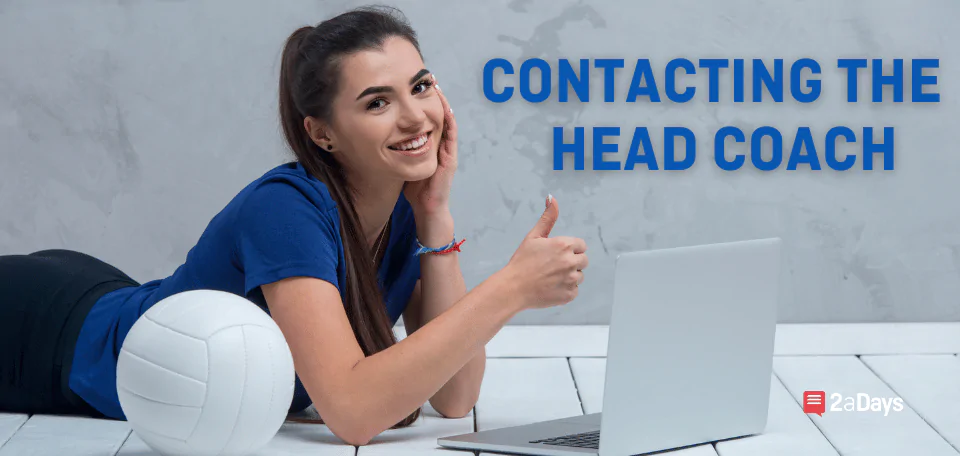
How Do I Reach Out to Coaches?
Reaching out to coaches is a vital part of the volleyball recruiting process. Not only does it show interest but it shows dedication and commitment. It is also valuing your coach's time and needs by allowing them to see what they're looking for. Reaching out first is definitely a must and also following up.
Following up is as important and even better during the volleyball recruiting process. Doing so shows that you respect the coach and their staff and are genuinely interested in what they have to offer.
When reaching out to your coach or coaches, include everything they are looking for. Your name, height, reach, best contact information so they can get back to you, be respectful and cordial as well as genuine. Coaches get tons of emails a day and almost all are generic so you really want to stand out and grab their attention from the start. It is also good to mention that you should give your email a great tone letting them know the person you are from the beginning of the volleyball recruiting process.
Related Post: 5 Key Guidelines for Emailing Coaches During the Recruiting Process
What should I include in my email to college coaches?
The email to the coach will be your first impression on them. Their expectations when receiving an email are that you have researched their program and have what it takes to be part of it. Some guidelines for the email according to the 2aDays include but are not limited to:
- Personalize your email. College coaches will receive a wide variety of emails, and if your email is not eye-catching or personalized enough, they will lose interest. Make yourself stand out from the wave of emails they get each day. Make sure you demonstrate that you have researched the school. Whether you mention the current athletes in your position, the school's stats, their history, and more.
- Make sure you include your current coaches' information. This will allow for the college coach to reach out to your coaches to find out more about you. This also gives your coaches an opportunity to make you stand out.
- Include athletic and academic information. You don't need to go all out in the email, but it is important to let them know you have what it takes to perform at the collegiate level in volleyball and in school.
- Give them a schedule of when and where you will be competing. They need to know where and when they can watch you in person. If not possible in person, then provide streaming links to your matches. This will allow them to add you to their list of players to watch out for.
- Get in contact with coaches around the end of your sophomore year and start of your junior year. No need to feel like you're running out of time because you are not!
- In addition to emailing coaches, try to reach out to current athletes on the team as well as prospective athletes looking to join the same school. This will allow you to network amongst each other and get an inside scoop on what the team is like and if you will like it as well.
Volleyball Highlight Reel Tapes
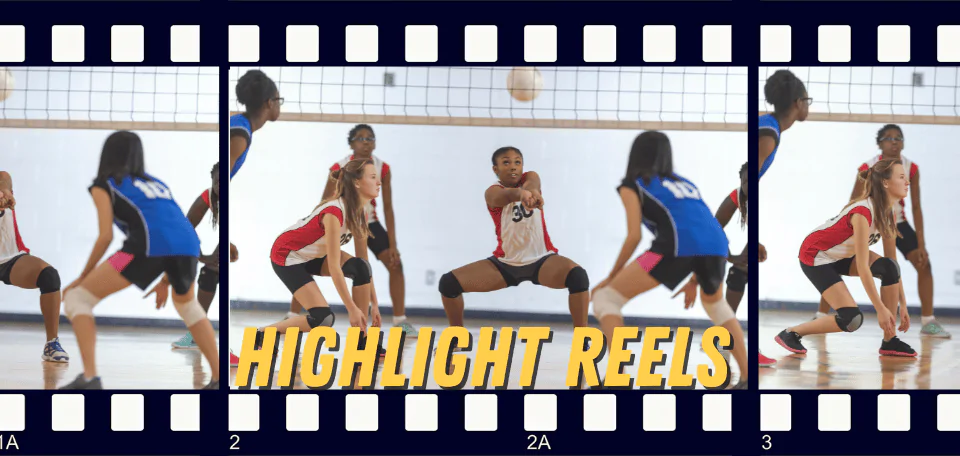
Required: 🗹 Yes
- You will need to be ready when asked for one and you will look prepared in front of your recruiter if you have one handy.
- Make it short and sweet–five minutes tops of your best plays
- You can add music but make sure it's not too loud or profane
- Don't include any footage of you being a bad sport, mouthing off to refs or having a bad attitude in general.
- Many college coaches will know if they want you or not from the first 20-30 seconds of your volleyball recruiting video, so make sure you really make yourself stand out from the start!
Related Post: How to Create a Volleyball Highlight Video Coaches Will Notice
Important Links For College Volleyball Recruiting
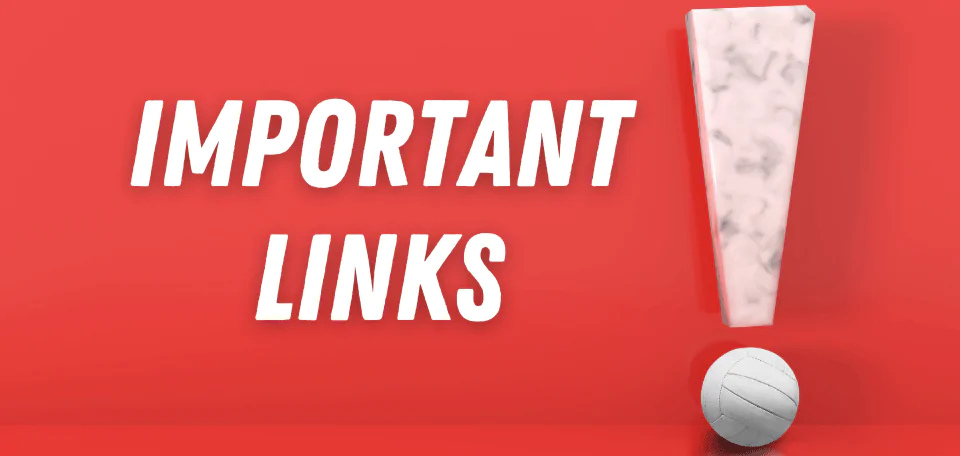
Athletic Associations:
- The National Association of Intercollegiate Athletics (NAIA)
- The Junior Volleyball Association (JVA)
- The National Collegiate Athletic Association (NCAA)
- USA Volleyball
Helpful Articles:
- 2aDays Volleyball Articles
- Top-Rated College Volleyball Coaches
- Tufts University Former Volleyball Player on her Recruiting Process
- 6 Tips to Get Recruited for Division 1 Volleyball
- How to Create A Volleyball Highlight Video Coaches Will Notice
Camps/Showcases:
- College Coaches Showcase Camp (CCSC).
- Penn State Volleyball Camp
- Raider Camps
- Volleyball Camps USA
- Talent ID Camps
Volleyball Coach Ratings:
* Originally published on June 9, 2023, by Lilia Farach
